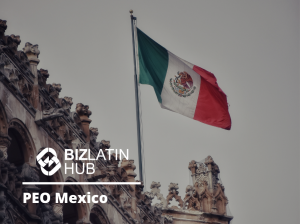Mexico’s welcoming business environment and progressive government offer many vital benefits to lure investors into the country. Mexican law allows 100% ownership and no capital controls for foreign businesses. Foreign entrepreneurs can establish a limited liability company, and enjoy the country’s strong property laws and protections.
We explore the next phase of commercial development sweeping through the Latin American giant and other regional powers: online business. Electronic commerce or e-commerce is transforming business’ ability to engage with the market, offering a promising channel for revenue generation.

E-Commerce in Mexico Overview: local business conditions
Mexican professionals are highly capable and have a competitive advantage over many neighboring countries. Without a doubt, global attention is turning towards Mexico’s favorable business conditions and emerging markets. As investment and foreign business move into the area, the country’s growth boosts its economic power on the world stage.
Benefits of e-commerce
According to The Balance SMB websites, there are several benefits to start using e-commerce to develop your business. They list 11 key advantages to e-commerce for businesses:
- Overcome geographical limitations
- Gain new customers with search engine visibility
- Lower costs
- Locate the product quicker
- Eliminate travel time and cost
- Provide comparison shopping
- Enable deals, bargains, coupons, and group buying
- Provide abundant information
- Create targeted communication
- Remain open all the time
- Create markets for niche products.
These benefits all utilize the convenience and availability of online shopping to the company’s advantage. A company’s customer reach is greater, their products are easily searchable, and new products get greater exposure.

Why choose Mexico?
Mexico has a population of more than 132 million people, 79.3% of whom are living in the cities. The population’s median age is 27.9 years. In 2018, Mexico experienced 60.6 million e-commerce transactions (with new customers making up 45.9% of this activity). With a revenue of US$8,140 million (+8.4%), the Mexican e-commerce market is gaining momentum and businesses should consider their prospects online.
Mexican e-commerce statistics
By 2018, e-commerce in Mexico reached a value of MX$396 billion (equivalent to US$20 billion). This represents a growth of 20% over the previous year. By June 2018, Mexico’s e-commerce market had grown 18% over the final figures of 2017. 60% of users bought a product or service online in the last three months. Annual buyers in Mexico represent 75% of users over 18 years in the country.
Online purchases for users in Mexico have increased every day. The most popular online commodities for 2018 includes:
- transport – this service leads the pack with a whopping 60% share in online purchases.
- nearly 5 out of 10 online shoppers in Mexico acquired digital services in streaming, music, and video mainly.
- tourism also increased compared to 2017, gaining another 2% of online shoppers’ attention.
In Mexico, MX$6,230 (approximately US$316.54) is the average quarterly expenditure value (excluding travel-related purchases). 30% of purchasers in Mexico pay to ship, and the average shipping amount is MX$100 (around US$5.08). Almost 8 out of 10 online shoppers in Mexico prefer to have their products delivered at their home.
Top sell products
In general, Mexican online shoppers are looking for travel services (flights, hotels, packages, and transport), electronics and appliances, clothes, events, or furniture. Buyers’ preferences represent an average shopping basket of:
- MX$4,250 (equivalent to $US216.67) and one article for travel services
- MX$5,075 (equivalent to $US258.73) and 1.5 items for electronics and appliances
- MX$950 (equivalent to $US48.43) and three articles for clothes
- MX$6,700 (equivalent $US341.58) and 2.5 articles for furniture
Promising outlook for e-commerce
Selling online in Mexico is worth considering for many international sellers. A well-thought-out global sales strategy will help overcome the initial burden of translating and localizing your online store.
The revenue of Mexico’s e-commerce market is projected to be US$9.441 billion in 2019. Experts expect it to show an annual growth rate of 7.9% (CAGR 2019-2023). This results in a market volume of US$12.778 billion by 2023. User penetration – otherwise known as the number of users expanding into a market – is expected to hit 52.7% by 2023. Mexico is therefore pegged to be one of the most promising online markets in the world.
Use an online marketplace
Global online merchants already exporting to Mexico can sometimes experience lower conversion rates in their international traffic than domestic traffic. Even in markets that share the same language.
The likely reason for this is that many of the components of localization, beyond translation alone, need special attention and tactics for optimization that are customized to different commercial environments. It is highly recommended to sell through large and well-known online marketplaces such as Amazon, at least in the initial phase of your expansion. This will remove the difficulty of having good translation and accessibility on your own site.
DIY: top 5 e-commerce platforms

Choosing how you set up your e-commerce store isn’t always easy, but businesses are given plenty of options. Make sure to consider the following when considering e-commerce activity:
- Should you sell on a marketplace or an e-commerce platform — or both?
- Which features and tools do you need? Which can you safely pass up?
- Can your chosen technology support your current sales volume, as well as support the growth of your business?
- What’s your technology budget?
While different e-commerce platforms offer different features, all of them give merchants the opportunity to build a branded online storefront to sell their products. This a shortlist of the different options you have in Mexico:
Shopify
Shopify is one of the most popular e-commerce platforms in the world, in part because of how simple it is to quickly launch a new store. This makes Shopify particularly popular with smaller e-commerce brands doing a lower order volume.
Depending on added features and order volume, Shopify’s monthly pricing can range from US$29 to US$299. Despite limited customization options, Shopify is a great option for SMB e-commerce merchants.
BigCommerce
With a wide variety of built-in features and customization options, BigCommerce appeals to both enterprise-level e-commerce merchants like Toyota and Natori and those who are just starting out.
Features include industry-leading uptime, advanced security, payment and order fulfillment partnerships, and a wide variety of built-in integrations with leading e-commerce apps.
BigCommerce can be an expensive option with a bit of a steep learning curve, but it’s popular for a reason — it offers a full-fledged store without complex backend hurdles, making it a great choice for a wide variety of merchants.
Magento

Magento is tailored mainly to enterprise-level e-commerce businesses. As an open-source e-commerce platform, Magento requires programming and developer resources, creating a higher barrier to entry than plug-and-play platforms like Shopify.
That said, Magento offers a wide variety of features for enterprise sellers, including the ability to offer discounts, support recurring payments, unlimited product listings, and much more.
The basic version of Magento is free, but the enterprise version can cost upwards of $20,000 annually. For large online stores, Magento can be a great choice, but we don’t recommend it for small or midsize businesses with smaller product catalogs.
WooCommerce
WooCommerce is a free WordPress plugin that allows e-commerce merchants to turn their WordPress sites into online stores.
One of the most popular e-commerce platforms in the world, WooCommerce includes its own secure payment processor and shopping cart. The open-source platform can be a great option for smaller brands with WordPress development resources on-hand.
WooCommerce is one of the only free e-commerce platforms, though it costs additional money to completely integrate the shopping cart.
If you expect your business to scale quickly, consider choosing a different platform — WooCommerce can slow down as additional customers and products are added to your store
Squarespace
Squarespace is known for sleek drag-and-drop templates that make it easy to build beautiful websites. On top of that, they offer many of the tools and features needed to build an e-commerce store. While Squarespace is popular with artists and creative with smaller product catalogs, they offer unlimited product listings, including multiple variants and SKUs.
They also support recurring payments and subscriptions, marketing tools for abandoned cart recovery, and a variety of other more advanced features. Pricing starting at $18/month make it a great and affordable tool for growing e-commerce brands.
How BLH can help you to start e-commerce selling in Mexico
Biz Latin Hub is a company established in 2014 to support local and foreign companies doing business in Latin America, offering a complete portfolio of back-office services; including bilingual legal, accounting, finance, taxation, recruitment, commercial representation, market-entry, and administration services.
Our group offers an extremely personalized service and fee levels that are competitively placed within the current international market. All services provided are in both English and Spanish. We are a market leader in aiding foreign and local companies and individuals establishing and developing themselves and their businesses in the region.
Our team of local and expatriate experts offers a range of legal and commercial back-office services that are customized to each of our clients’ needs. We can help you and support you in your project.
Contact us today for personalized support. We’re ready when you are.




